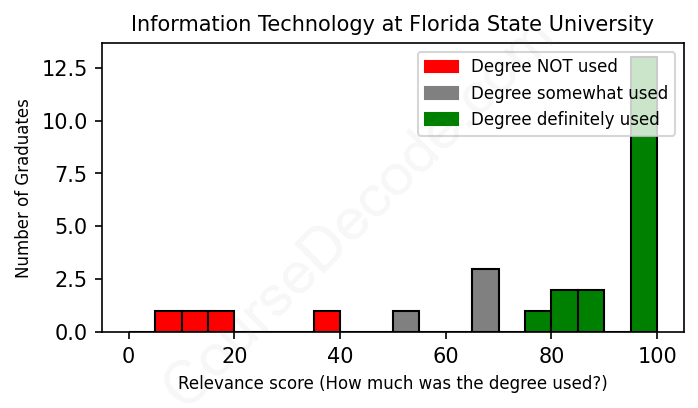
First, some facts. Of the Information Technology graduates from Florida State University we've analyzed , here's how many have used (or NOT used) their degree in their career:

These are estimates based on AI analysis of 26 LinkedIn profiles (see below).
The verdict? Significantly above average. Overall, with an average relevance score of 78%, Information Technology graduates from Florida State University have a much higher likelihood (+11%) of finding work in this field compared to the average graduate across all fields:
And for comparison, here's the chart for all profiles we've looked at across all degrees.
Also, after graduating, only 23% of these graduates have pursued further education other than another Bachelor's degree (such as a Masters degree or other), compared to the average across all profiles of 35%. This suggests a Bachelors degree is enough for most Information Technology graduates, and it's normal to look for work straight after graduation.
See the details:
|
Relevance score: 88% We think this person has gone into a career highly relevant to their degree. We think this person has gone into a career highly relevant to their degree.
DEGREE INFOGraduated in 2013 from Florida State University with a Bachelor's degree in Information Technology. No other secondary education since. JOB HISTORY SINCE GRADUATIONLibrary Assistant, IT Specialist: Florida Diagnostic Learning Resource Service Jan 2013 - Jun 2013 System Administrator, Webmaster, Technical Support:  Florida State University 2013 - 2014 Multimedia Design Specialist  Florida Housing Finance Corporation Sep 2014 - Oct 2016 CEO  Platowynne Oct 2016 - Present ABOUTNo information provided. |
The top 10 most common jobs done by the graduates we've analyzed (ranked most common to least) are:
When looking at the job paths of folks who graduated with a degree in Information Technology from Florida State University, there’s a pretty mixed bag of outcomes. A good number of them have landed roles that are closely tied to IT, like software engineers, data analysts, and IT support specialists. These jobs clearly draw upon the technical skills and knowledge gained from their studies, showcasing their competency in areas like programming and system analysis. For instance, positions like System Administrator and Data Analyst require extensive IT knowledge, making them highly relevant to the degree. However, there are also quite a few graduates who have taken roles that don’t relate much to IT at all, such as communications coordinators or sales associates. It shows that not every graduate sticks strictly to the tech path.
In general, while many grads find roles that align directly with their IT education, a significant portion end up in jobs that leverage only peripheral skills or are entirely outside the technology realm. For example, roles like management in non-tech areas or freelance writing don't really utilize the core IT expertise. It’s a reminder that a degree can open a lot of doors, but it doesn’t guarantee a straight shot into an IT-specific career. Still, it’s great to see that many have utilized their IT skills effectively in their jobs, reflecting the versatility of the degree. Ultimately, it all boils down to personal choice and career goals after graduation!
Here is a visual representation of the most common words in job titles for Information Technology graduates (this is across all Information Technology graduates we've analyzed, not just those who went to Florida State University):

Graduates from Florida State University with a degree in Information Technology have generally pursued a range of careers that are quite relevant to the field. Many of the first jobs after graduation tend to be in roles like IT support, systems analysis, and programming, indicating that these graduates often land positions that allow them to apply their technical skills right away. For example, some recent graduates have stepped into roles as IT Audit Analysts or Customer Support Engineers, which align well with their academic backgrounds. Over time, as they gain experience, many move up into more senior roles—such as Senior Consultants, Project Managers, or Software Engineers—showing a clear career progression within the IT industry.
Looking five to ten years down the line, it's encouraging to see that a significant number of these graduates are not just staying in tech-related fields but are advancing to managerial and leadership positions. For instance, some have taken on roles like Director of Services or Infrastructure Engineers, which suggests they are carving out successful careers that utilize their educational foundation. However, there are some outliers who transitioned into less tech-focused roles or positions that seem a bit disconnected from Information Technology, like communications or general business management. Overall, though, it's clear that many FSU IT grads are leveraging their degrees effectively, carving paths in the tech world where they can thrive.
Honestly, getting a Bachelor’s degree in Information Technology can be a mixed bag, and it really depends on your interest and aptitude for tech stuff. At Florida State University, you can expect a solid curriculum that dives into both the technical and theoretical aspects of IT, so if you're into computers and problem-solving, it could be pretty engaging. Some students find the programming and networking courses to be challenging, especially if math isn't their strong suit. Overall, it’s probably about average in difficulty compared to other majors; if you put in the effort and stay organized, you'll likely be fine. Just be ready to tackle some tough concepts, and don't hesitate to reach out for help when you need it!
Most commonly, in the LinkedIn profiles we've looked at, it takes people 4 years to finish a Bachelor degree in Information Technology.
Looking at these graduates from Florida State University, it seems like many have landed pretty solid jobs that would likely pay decent money, especially in the tech field where salaries tend to be on the higher side. For instance, those in software engineering, data analytics, and IT support roles often start with good pay and can quickly move up the ladder. Some of the earlier grads have worked their way into managerial or specialist roles, suggesting a gradual increase in earnings. On the flip side, a couple of profiles show more entry-level positions or roles in education which might not have the same earning potential. Overall, it looks like most of them are doing well financially or on track to make good money in their careers!
Here is a visual representation of the most common words seen in the "about" section of LinkedIn profiles who have a Bachelor degree in Information Technology (this is across all Information Technology graduates we've analyzed, not just those who went to Florida State University). This may or may not be useful:

Here are all colleges offering a Bachelor degree in Information Technology (ordered by the average relevance score of their Information Technology graduates, best to worst) where we have analyzed at least 10 of their graduates: